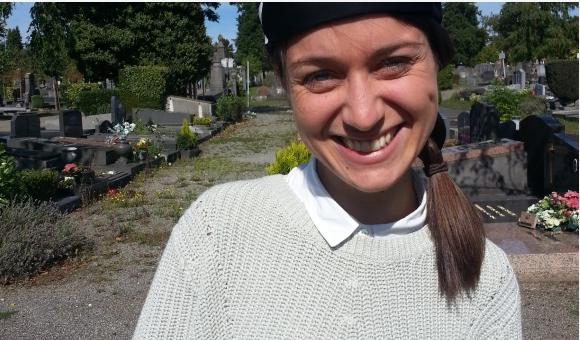
Interview with French Canadian Ève-Line Cadotte, doctoral student in Engineering Sciences, Chemistry and Material Sciences at the Université libre de Bruxelles
Hello Eve-Line! Can you introduce yourself and tell us about your academic background?
My name is Ève-Line Cadotte, I am 31 years old and I am a doctoral student at the Université Libre de Bruxelles (ULB). I have a Bachelor's degree in Mechanical Engineering at the École de technologie supérieure (ETS). During my time as an undergraduate I had the opportunity to take part in an exchange programme in the United States, specifically in West Virginia. This made me want to have more experiences abroad. That's why, as soon as I got home, I applied to come and study in Belgium, at ULB, initially as part of a second exchange programme. After this short experience in Belgium, I went back to North America to finish my Bachelor's degree before coming back to Belgium to do a Master's degree in Energy and Electromechanics and now a PhD in Chemistry and Material Sciences.
What gave you the idea to come and study in the Wallonia-Brussels Federation? Why did you choose the Université libre de Bruxelles?
On my first exchange programme I was still in a North American context, as I had not left my home continent. So I wanted a change of scenery, but this time without giving myself a language barrier. Belgium seemed pretty nice, especially because of the French-speaking side. ULB seemed to me to be a great option, especially for its location within the capital. I also had a professor in Montreal who was in touch with another professor at ULB, which reassured me and confirmed my choice.
Tell us about the scholarship you received. Did it play a role in your decision to study abroad?
Yes definitely! The scholarship enabled me to complete my Master's degree in Belgium. It was stressful waiting for the response so when I got it, it was a relief! The scholarship covered both years of my Master's degree. It's a pretty big amount that allows me to have a decent standard of living and it has really changed the course of my studies, financially at least.
What has the studying for your doctorate in the Wallonia-Brussels Federation brought to your research career? And from a personal point of view?
ETS was practice-oriented and at ULB, the learning is focused on the theoretical side, which is something that was sorely lacking in my personal and professional experience. On a personal level, my role as an assistant allows me to be in contact with many students and to share my knowledge and analysis in order to test my understanding of different theoretical concepts. Also, having interns and thesis students allows me to see the other side of things, to work in a team and to accompany students in their learning, which helps me a lot in my PhD.
What advice would you give to students who are thinking about studying in the Wallonia-Brussels Federation?
Find a kot! It’s a shared flat specifically designed for students, where you can rent a single room. Living in a kot means you meet a lot of people. That's what helped me build my social circle when I arrived in Brussels. There are also dedicated Facebook groups for Quebecers who live in Brussels, which can help us feel less isolated when we arrive in a new city. Getting involved in the sports programs at ULB can also help you stay in shape while meeting new people.
Interview made by Charlotte Evrard, project manager at the Délégation générale Wallonie-Bruxelles in Quebec.